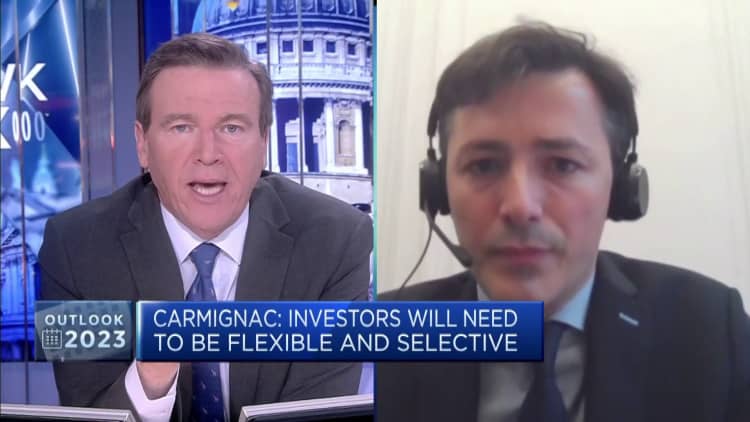Euro zone inflation rate eases slightly to 10% as surge in energy prices slows
Markets track the latest inflation data out of the euro zone ahead of a new ECB meeting.
Julien De Rosa | Afp | Getty Images
Inflation in the euro zone slowed slightly in November, according to preliminary figures out Wednesday, with prices coming off record highs and missing analyst expectations.
Consumer prices have been sky high across the 19-member region for several months. Inflation rose above the 10% mark last month, highlighting the severity of the cost-of-living crisis in the bloc.
The initial data Wednesday from Europe’s statistics office showed headline inflation at an annual 10% this month — representing a 0.6 percentage point fall from October.
Energy and food continued to contribute to the lofty inflation figures, but with a noticeable drop in the former. Energy is expected to have stood at an annual rate of 34.9% in November, compared with 41.5% in October, according to Eurostat.
“The fall in headline HICP inflation from 10.6% in October to 10.0% in November was the first decline since June 2021 and was a bigger fall than originally expected,” Andrew Kenningham, chief Europe economist at Capital Economics said in a note.
“We would not be surprised to see the headline inflation rate rise again in December or January given the volatility in the monthly numbers, but there is little doubt that it will fall rapidly next year,” he added.
The euro dropped slightly against the British pound, trading at £0.863, and rose about 0.4 percentage points against the U.S. dollar at $1.037 shortly after the figures were released.
The easing in inflation comes after a similar set of data out of the United States. Earlier this month, the October consumer price index came in below expectations.
ECB hikes?
Lower inflation figures could be a reflection of recent increases in interest rates and could mean smaller, or less, rate hikes in the coming months. However, speaking earlier this week, ECB President Lagarde predicted further changes to its benchmark rate.
“We expect to raise rates further to the levels needed to ensure that inflation returns to our 2% medium-term target in a timely manner,” she told European lawmakers.

The central bank has raised rates three times this year and it is expected to do so again in December. However, there is a huge uncertainty as to how many rate hikes the ECB will announce next year.
Some economists argue that officials will have to take a break to allow for the real economy to react to the higher rates, while others believe inflation is at such high levels that it needs further rate moves.
The ECB estimated in September that annual headline inflation will reach 8.1% for 2022 and 5.5% in 2023. These figures are expected to be revised upward when the central bank meets in December.
For all the latest World News Click Here
For the latest news and updates, follow us on Google News.

